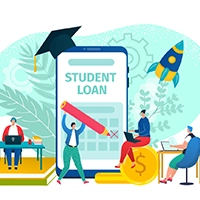Best Education Loan Options for Studies in India & Abroad
Higher education is an important milestone leading to a brighter and more stable future, yet its expenses continue to rise. All students who decide to study inside or outside India must deal with high educational costs. Multiple education-related expenses, including tuition costs, together with hostel or rental payments, book expenses, travel costs, and living expenses, add up rapidly. It becomes challenging for numerous families to handle their educational costs without education funding. With educational finance, students receive the opportunity to progress in their studies without postponing their ambitions or goals. Such loans create a pathway from dreams to budgetary possibilities so students can concentrate on their education instead of financial stress.

Finmarra enters as the solution for educational needs. Students and their parents encounter multiple problems when searching for sources to finance their education. Our organization guides students to acquire suitable education financing for their specific program location and funding needs. A network of trusted lenders permits Finmarra to provide loans that have affordable interest rates, along with flexible payment plans and easy-to-understand conditions. We assist students through every step of loan options selection and paperwork completion until their successful online application, so the process remains easy and hassle-free. Having proper guidance helps simplify the process when selecting an education loan due to its importance as a major decision. Finmarra exists to let you feel comfortable about going forward with your future development without affecting your family finances. The complete, straightforward information about education loans presents itself in this guide, along with a detailed clarification of essential concepts.

Lowest Interest Rates on Education Loans for Indian Students
Interest rates can vary from one lender to another based on the course, the institution, and your credit profile. On average, education loan rates in India start around six point five percent and can go up to thirteen percent.
Some public sector banks offer lower rates, especially when you apply through government schemes. Private banks and NBFCs may charge slightly higher but give faster approvals and flexible terms.
Girls often get a small concession on interest rates from many banks. It is also important to check if the rate is fixed or floating. A floating rate may change during the loan tenure, while a fixed rate stays the same.
Types of Education Loans for Studies in India & Abroad

Domestic Education Loan
This loan is for students who wish to pursue higher studies in India. It covers tuition fees, exam fees, books, equipment, hostel fees, and travel expenses if needed. Most banks offer up to twenty lakh without collateral for top-rated institutions.

Overseas Education Loan
This loan supports students planning to study abroad. The lack of regular income among students leads banks to evaluate the financial stability of their co-applicant, who acts as a guarantor. Better conditions on your loan arise from having a strong credit rating and stable income levels from your co-signer.

Loan for Vocational or Skill-Based Courses
Not all education loans are only for academic degrees. Many banks now offer loans for short-term courses like aviation, hospitality, design, animation, or other skill-building programs. The eligibility and loan amount depend on the course duration and the reputation of the institute.

Loan with Collateral vs Without Collateral
Loans without collateral are called unsecured loans. They are usually given for smaller amounts or courses from top-ranked institutions. Loans with collateral require you to pledge an asset like a house, land, or an FD. They usually come with lower interest rates and higher loan amounts.
Apply for the Best Education Loan with Low Interest Rates
Ready to fund your higher education? Apply for the best education loan with low-interest rates today. Get expert guidance and easy approval with Finmarra. Start your journey now!
What Documents Do You Need to Apply For an Education Loan?

Admission Proof
You must provide an admission letter from the college or university clearly stating the course details and duration.
Admission Proof
You must provide an admission letter from the college or university clearly stating the course details and duration.

KYC Documents
Basic documents like identity proof, address proof, and age proof are required for both the student and the co-applicant.
KYC Documents
Basic documents like identity proof, address proof, and age proof are required for both the student and the co-applicant.

Income and Collateral Proof
If collateral is required, property papers, valuation reports, and legal clearance documents must be submitted. Income proof like salary slips, Form Sixteen, and bank statements of the co-applicant are also needed.
Income and Collateral Proof
If collateral is required, property papers, valuation reports, and legal clearance documents must be submitted. Income proof like salary slips, Form Sixteen, and bank statements of the co-applicant are also needed.

Key Points to Compare Before Choosing the Right Loan
Interest Rate (Fixed vs Floating)
Check if the loan interest is fixed for the entire term or if it can change later. Fixed rates offer stability, while floating rates can be cheaper initially but may rise later.
Moratorium Period and Grace Terms
Most education loans offer a moratorium period, meaning you do not have to start repaying immediately. Usually, you get six months to one year after completing the course to start EMI payments. Understand the exact terms because some banks add interest during this period.
Repayment Tenure and EMI Flexibility
Repayment tenures can range from five years to fifteen years. Longer tenure means lower EMIs but higher total interest paid. Some banks allow partial prepayments without penalties, helping you close the loan faster if your income rises.
Processing Charges
Some banks charge a processing fee when you apply for a loan. It can range from 0.5% to 2% of the loan amount. Always check this cost because it can impact your overall loan cost.
Subsidy Schemes
Government schemes like Vidya Lakshmi and Padho Pardesh offer interest subsidies for eligible students. These schemes help reduce your burden during the moratorium period. Make sure to check if you qualify for any subsidy before finalizing the loan.
Why Choose Finmarra as Your Trusted Education Loan Partner?
Step-by-Step Guide to Apply for an Education Loan Online
Check Eligibility
Visit the lender's website or Finmarra’s platform to check basic eligibility based on your course, location, and loan amount.
Compare Loan Offers
Evaluate different lenders based on interest rates, moratorium terms, processing fees, and repayment flexibility.
Gather Required Documents
Collect all necessary documents like the admission letter, mark sheets, KYC papers, income proof, and collateral papers if needed.
Fill Application Form
Submit the loan application form online. Provide accurate details about the course, institute, personal information, and financial background.
Upload Documents
Scan and upload all required documents securely. Some lenders offer instant verification through online systems.
Loan Assessment and Approval
The bank verifies your documents and may call you or the co-applicant for a short discussion if needed.
Loan Disbursement
Once approved, the loan amount is directly disbursed to the institution or as per the fee schedule provided.
Education Loans Eligibility Criteria for Students & Co-Applicants

Age, Admission Confirmation
Students must usually be between sixteen and thirty-five years old at the time of loan application. You must have an admission letter from a recognized university or institution.

Academic Performance
Good academic records improve your chances of getting a loan. Some lenders ask for minimum marks in previous qualifying exams, especially for unsecured loans.

Parent or Co-applicant’s Income and Credit Score
The lack of regular income among students leads banks to evaluate the financial stability of their co-applicant, who acts as a guarantor. Better conditions on your loan arise from having a strong credit rating and stable income levels from your co-signer.




